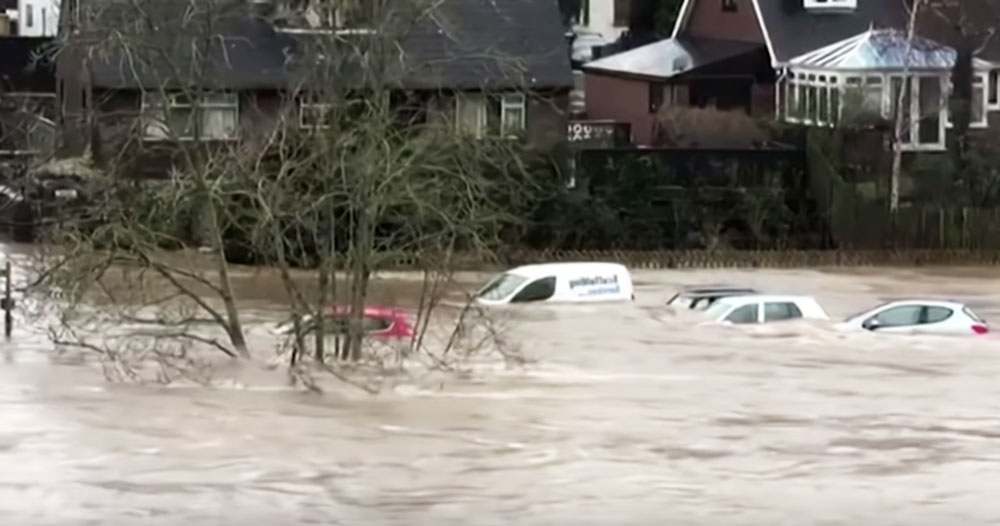By Sue Venn, Kate Burningham and Anastasia Loukianov
This blogpost was previously posted on CUSP
In this short blog, CUSP researchers Sue Venn, Kate Burningham and Anastasia Loukianov reflect on the challenges of conducting place based research on what people need to live well within planetary limits, whilst sharing the direct consequences of extreme weather conditions.

Image: Still from Guardian footage, covering the flood in Hay-on-Wye; © Jonathan Sayce | https://youtu.be/S4y4tpb7bKs
It would be hard to ignore the unprecedented flooding that has impacted the UK in so many ways following Storms Ciara and Dennis. Media headlines have told us of higher than ever river levels, increasing numbers of severe flood warnings—and their consequences in terms of risk to life, long term economic implications, and the difficulties communities face simply getting on with their day to day lives. Research indicates that the experience of flooding is socially unequal too, with poor and marginalised individuals and communities often most severely affected and least able to recover from losses (Walker and Burningham 2011). We are not explicitly researching flooding at the moment, but over past weeks the ongoing effects of the floods have led to new reflections about our current projects. The premise of our work within CUSP is to explore different visions of what it means to live well in neighbourhoods where social inequalities and distinctions are apparent. Within this work we are exploring how and in what form concepts of social and environmental justice enter ordinary people’s accounts of the good life and how the ‘sustainable prosperity’ of particular places is variously understood. This work has taken us to different places in the UK, and connected us to researchers in other cities around the world. What we hadn’t taken into account, until now, is how the shifting and escalating consequences of climate change would directly impact on our own day to day experiences of conducting research. Recently we came (nearly) face to face with the reality of living in a flood zone. Whilst preparing for a trip to Hay-on-Wye to conduct focus groups, Storm Dennis contributed to the River Wye breaching its banks and flooding large areas of the Wye Valley, including roads, homes, farms and even whole towns. As we gathered together wet weather clothing, wellington boots and emergency rations in case of encountering flooding on our journey to Hay, the reality of living with the consequences of climate change hit home, although clearly not to anything like the same extent as for those in the midst of it. We abandoned the trip of course and were thankful that in our own home towns we were only mildly affected by rising river levels. However, one of the ‘side effects’ of doing social research, particularly qualitative social research, is that over time the places and people we speak to become almost as familiar to us as our own neighbours. Hearing first hand individual and community experiences of flooding as it happens is consequently sobering. The question for us is how our own experiences, and our responsibility for our participants, will shape our future research as we navigate our way through new (sometimes flooded) terrains and continue our research in different locations. Those who conduct social research will know the challenges of speaking to hard to reach audiences, but recent experiences have shown us that they can now be, literally, hard to reach. As we move forward with our work we will need to consider how we can continue our conversations in these spaces, and to double our efforts to ensure as many as possible, and especially those individuals and communities with the least resources, are given the opportunity to share their experiences if we are to contribute to enabling socially fair and just transitions to a sustainable future.
Walker, G. & Burningham, K. (2011) Flood risk, vulnerability and environmental justice: evidence and evaluation of inequality in a UK context. Critical Social Policy Vol 31 No. 2: 216-240.
Please note: Blog entries reflect the personal views of contributors and are not moderated or edited before publication. However, we may make subsequent amendments to correct errors or inaccuracies.
